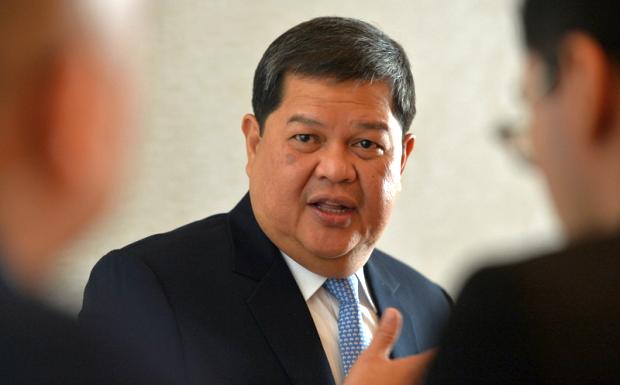Many reforms, little time: BSP chief passes away at 60

The late BSP Governor Nestor A. Espenilla Jr. (Photo from the Bangko Sentral ng Pilipinas)
The announcement of Finance Secretary Carlos Dominguez III last May 8, 2017, that Rodrigo President Duterte had named Bangko Sentral ng Pilipinas Deputy Governor Nestor Aldave Espenilla Jr. as the country’s next central bank chief was, as to be expected, welcomed roundly by all stakeholders in political, business and financial circles.
For many in the banking community, however, the decision to appoint the veteran regulator of over three decades as the helmsman of the Philippine banking industry was met with quiet trepidation.
Espenilla had, after all, cut his teeth as the proverbial “bad cop” in charge of the BSP’s supervision and examination department — the unit responsible for strictly keeping financial institutions in compliance with banking laws, and meting out harsh penalties for those that don’t. He was the was the enforcer, the sharp end of the spear, of the central bank.
“Nesting,” as he was known to friends, died Saturday evening, Feb. 23, 2019, after a 15-month battle with cancer that was first diagnosed in his tongue.
During his abbreviated tenure as central bank chief, however, Espenilla surprised his stakeholders in the banking community not by clamping down on financial activities, but doing the exact opposite: He liberalized many restrictive financial market rules and gave banks free rein to conduct their business — as long as they fully recognized the risks and remained accountable for any financial trouble they might get themselves into.
In the case of the country’s volatile foreign exchange market, the new BSP chief bewildered many bankers by refusing to intervene to prop up a steadily weakening peso in late 2017 and 2018, when wary investors were converting their assets into US dollars and pulling them out of the country.
“What’s he doing? Why is he allowing the peso to fall?” asked many a banker during those months, most of them used to the financial market micromanagement styles of the three previous central bank governors going all the way back to the early 1990s.
In previously unpublished comments made to the Inquirer in Dec. 2017, Espenilla gave a key insight as to why he was turning the central bank regulatory model on its head, after faithfully serving as “chief enforcer” of the conservatives rules of BSP Govenors Gabriel Singson, Rafael Buenaventura, and Amando Tetangco Jr.
“When you’re working for a particular governor in a specific role like mine, you have to execute their game plan,” he said, explaining what appeared to many as a 180-degree philosophical shift. “But now that I’m governor, it’s time to implement the reforms that I really believe in. And liberalization is one of them.”
“It’s time to stop treating banks like small children, and let them progress on their own merits or make mistakes at their own expense,” added the man who was, for most of his career, in charge of disciplining erring bankers and financial institutions.
Espenilla joined the BSP just two years before an economic crisis pushed the Philippines into de facto bankruptcy in 1983, stopping its repayment of foreign debt due to a lack of dollars.
After graduating magna cum laude from the University of the Philippines with a degree in business economics, he worked for an honors MBA degree in 1982 and steadily rose through the ranks at the BSP until he was appointed deputy governor in 2005.
Espenilla accumulated over 37 years of experience in all aspects of modern Philippine central banking like monetary policy, banking supervision and financial regulation, payments system oversight, capital markets development, currency management, consumer protection, and financial inclusion advocacy.
Apart from foreign exchange changes, he started many other reforms as BSP chief, some of which were unpopular with banks whose status quo he was upsetting.
These included pushing them to start a formal bond repurchase market, ordering banks to make the peso directly tradeable with the Chinese yuan, and starting the ball rolling toward substantially reducing the amount of cash banks must hold in reserve — funds that he felt could be used more productively as loans.
Espenilla’s penchant for disrupting the status quo extended into his own backyard, ordering an organization-wide periodic reshuffling of employees — a move meant to provide key personnel with better-rounded skills but opposed by many bureaucrats who were hesitant to adapt to his new methods.
This was complicated by Espenilla’s well known professional rivalry with Deputy Governor Diwa Guinigundo with whom he would sometimes clash, sometimes quietly but sometimes played out in public through diverging policy statements.
Externally, he was faced with the toughest macroeconomic environment faced by the country in almost a decade, with inflation soaring to a nine-year high, due mostly to factors beyond his control, but possibly aggravated by divisions among policymakers about how best to fight high prices.
Espenilla lived long enough to see the end of the 2018 inflation crisis, but worried reporters earlier this month when he failed to reply to queries about the receding price threats sent to him via the central bank press’ WhatsApp message group.
Most importantly, however, the BSP chief will be remembered best for his personal advocacy of improving financial inclusion among the large swath of the Filipino population that continues to be “unbanked.”
Under Espenilla, the central bank made substantial inroads into making it easier for millions of Filipinos to have access to the formal banking system, many via electronic payment systems or “e-wallets” available on their mobile phones.
All told, he served as the BSP governor for one year, seven months and 22 days — the shortest stint on record for the country’s central bank governor. But in this brief period, he dared to begin many reform measures much needed by the banking system which his predecessors found too challenging to commit to.
For now, only time will tell whether Espenilla’s bold reforms will take hold. /atm